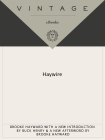Haywire by Brooke Hayward (book club books .txt) 📗

- Author: Brooke Hayward
Book online «Haywire by Brooke Hayward (book club books .txt) 📗». Author Brooke Hayward
As Bridget and I pored over the yellowing photographs and trophies of Mother’s youth, we realized how surprisingly uninformed we were about that, too. Sometimes, looking amused, she had told us stories about herself, mostly disparaging. In all her schools and camps she’d always been undersized, the shortest and skinniest and the last to develop (“Why, I was eighteen and had given up hope for good that I would ever have a female figure—when overnight—let that be a lesson to you”), for which she compensated with her cherished tomboyishness and athletic prowess. She told us how she was, from the beginning, so stubborn (or, at least, so spoiled) that she refused to be weaned from her bottle until she was five. Then, on a sightseeing tour of Mount Vernon, as she leaned dreamily on the velvet ropes that partitioned George Washington’s bedroom off from the public, she yawned for a second, and the ubiquitous bottle of milk dangling by its nipple from her mouth crashed to the floor, rolled across the priceless rug, and disappeared under Washington’s bed.
Her memories of childhood were tinged with ambiguity: deep pride about her Southern ancestry and customs, offset by a rebelliousness against that pride, as if any feeling so ingrained must also be pompous. Mother had hair-trigger reflexes about pomposity, particularly in herself, and never allowed it to go by without a few lighthearted jabs.
Although she scoffed at what she considered to be her family’s overzealous obeisance to its lineage, she gave me her own middle name, inherited from her great-grandmother Priscilla Brooke Fleet Smith, wife of James Smith, State Senator, lawyer, and master of Smithfield plantation. (“You were doomed to have that name whether you were a girl or boy,” she used to tell me, “if for no other reason than it’s a good strong name that can’t be abbreviated or tampered with.”) A congratulatory letter written to Mother by her older half-sister, Lewise, at the time of my birth referred to her ambivalence and was, unwittingly, a perfect example of what caused it: “Dearest Peggy … I can hardly wait to see the baby. Leland said she was beautiful and Mother tells me you are going to name her Brooke. Mother also wrote me that you had asked about the family genealogy for possible names; so I immediately set to work to copy the old Smith and Fleet genealogies for you.… I have also in my possession a beautiful photo-static copy of a chart which traces our ancestry directly back through the Smith and Throckmorton lines to the early kings of France and England.…” (“Oh, my God, so what?” Mother would exclaim irreverently when confronted with this sort of information pertaining to her forebears. “Pugh. Who really gives a damn? Virginians. That’s the best and the worst about them, their awful pride.”)
We barely knew her parents. We saw them only once: they came to California for a few weeks while she was in England. Afterward we didn’t feel we knew them any better. Mother’s descriptions of them had never enabled us to form any clear image of what to expect—other than a thick syrupy drawl, which, as she warned us,





Comments (0)